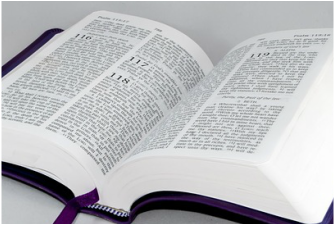|
Today's Scripture begins Jeremiah's third message from the Lord. Jeremiah Chapter 7 Lessons from the text God Sees Sin People may feel like God does not see them; they will not have to pay the consequences for their sin because no one knows about it. God, however, is astonished at all the sins people commit, even to the point that he tells his people, “Don't you see what they're doing!" You may be able to hide the wickedness of your heart from other people. Your spouse or children may not even see it. But God does. He exposes sin. Jesus says that those who sin wish to stay hidden; they know they have done wrong and do not wish to be exposed (Jn. 3:20). God makes it His job to expose sin. He wants all of the wickedness of your heart to be brought out into the open before Him so that you can repent of it. When you realize you cannot hide your sin, you're forced to address it, to either completely reject God or ask for forgiveness. Such is why God is so explicit in His preaching and in His word to distinguish what is right from what is wrong, as well as give His prophets the details about people's sins. He wants His believers to be able to perceive sin in other people’s lives so that they can reveal it to the sinner in the hope that they may repent. This divine illumination also serves as a warning to the believer of what not to do. Such takes away any excuse of ignorance, making all guilty of their sins before a holy God. Verse by Verse Commentary1-2 God wants this message to be proclaimed from His holy temple in Jerusalem. While the message in chapter 3 is directed towards the Northern kingdom, this message is specifically for the southern kingdom (3:12). 3-7 God opens His message with the promise that if the people repent, they will be able to live peacefully in their own homes. He encourages them to not trust in the presence of the temple but in righteous living to be found acceptable before God. Just because one goes to church, pays one’s tithes, and fulfills the social requirements of serving God does not mean that one is in a right relationship with Him. Samuel told Saul that to obey is better than sacrifice (I Sam. 15:22). God is far more interested in mankind treating each other with dignity, respect, and righteous judgment than in any religious act one can perform. 8-10 God rebukes the people because they are not living righteously. God did not deliver them from Egypt and establish them as a kingdom, giving them rest roundabout from all the enemies, so that they would have the liberty to sin. Believing that God’s salvation frees one to live however one chooses is to trust in lying words. 11-15 Shiloh is where Joshua, at the instruction of God, first put up camp in Canaan (Josh. 18:1). It is also the first dwelling place of the tabernacle. Jesus quotes this verse and Isaiah when He cleanses the outer courts of the temple, rebuking the merchant for profaning the purpose of the temple (Mt. 21:13, Mk. 11:17, Lk. 19:46, Jn. 2:16). God's tabernacle, and later His temple, are supposed to be a places of prayer and supplications (II Chro. 6:18-21, Isaiah 56:7). Yet the Jews, because of the corruption of the Levites, view the temple as a home to robbers. This references an event in Shiloh which occurred when Samuel the Judge was just a child in the care of the high priest, Eli. Eli had two sons who defiled the priesthood and Eli did nothing to prevent it. Therefore, God proclaimed evil against Eli and his house. When the Philistines invaded, Eli’s sons went with the Ark to battle, for the people were under the foolish belief that as long as they had the Ark, they had God on their side. The Philistines overran the Jews, took the Ark, and killed Eli’s sons. When Eli heard the news, he fell over backwards from his seat by the gate of Shiloh. Breaking his neck, he died. God passed judgment on all of his house because he honored his sons above God, allowing them to defile God’s sacrifice (I Sam. 2:12-4:22). Just as God did with Eli, He has called and called to the Jews to repent, but they have not. Because they have no respect for His sacrifices, He has pronounced judgment against them. Just as Eli’s house was struck from the priesthood, so, too, the Jews of Jeremiah’s days will be struck from their homes, removed from serving God in their own lands. 16 God tells Jeremiah not to intercede for those who have committed the gross sin of corrupting God’s laws. Even if Jeremiah does pray for their pardon, God will not listen to it. See Jer. 15:1. 17-20 God explains why He will not hear any prayer for intercession for the people. They have, from the eldest to the youngest, willingly aided in the sacrifices and offerings to other gods. Idolatry is not what angers God; the willful confusion that it brings angers Him. People willingly choose to pursue other gods and explanations for the meaning of life, filling their minds with more and more false information, thus bringing them into a further state of confusion. In response, God will pour out judgment, and nothing can dissuade Him from doing so. 21-31 When God delivered Israel from Egypt, He did not do so on the condition that they serve Him with the Mosaic Law. The only stipulation was that they follow His leadership and obey whatever commands He would give them; that is, God demanded them to have an obedient heart and not to fulfill religious rituals. When one’s heart is obedient, one will naturally fulfill God’s commandments, but fulfilling the commandments without an obedient heart is pointless. As the Jews in the wilderness failed to be obedient again and again, even so their generations have failed to serve God with an obedient heart. Unfaithfulness has been a plague to Israel ever since they left Egypt. False gods and selfish desires have overrun the majority of the people the majority of the time. Whatever revivals they had, such as under David’s rule, was short-lived and lasted only as long as that righteous judge or king was in charge. The Jews have willfully walked away from the truth to pursue the confusion of false gods and refuse to be reprimanded. God therefore calls for the Jews to mourn for the idolaters. On setting up an abomination in the temple, see II Kings 21:4-9. As this verse makes clear, the phrase “passing through the fire” refers to the actual killing of one’s children by offering them as a burnt offering to a false god. The Lord is not in the murdering of one’s children. It is so far from Him that it has not even entered His mind to ask if of humanity. 32-34 In Scripture, Tophet and the valley of Hinnom are symbolic of hell; its the place where death and fire reign. The valley gained this meaning because of all the child sacrifices offered there. When the idolatry of the Jews is revealed for what it is, slaughter, then joy will be taken from them, and even their lands will be desolate. This is referring to the coming deportation by Babylon. ___________________ Thank you for your faithfulness in studying God’s word. Please comment below to share what you learned from today's lesson.
0 Comments
Leave a Reply. |
Devotional Categories
All
Archives
September 2023
|
|
Join my mailing list!
|
Thank you!You have successfully joined our subscriber list. |
|
© 2024 Melissa Beaty
|
